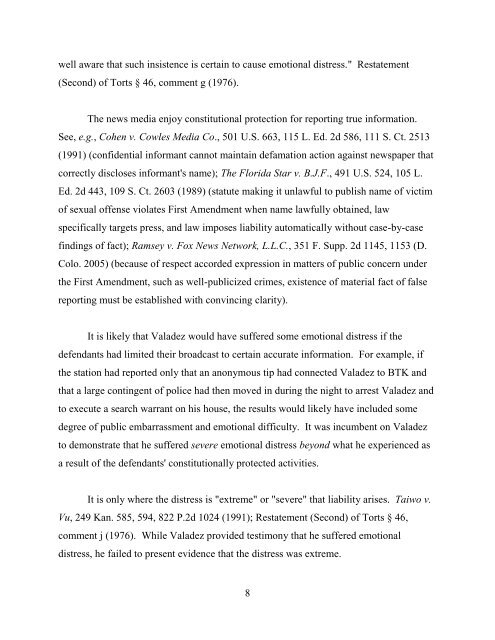99139 - Valadez v. Emmis Communications
99139 - Valadez v. Emmis Communications
99139 - Valadez v. Emmis Communications
You also want an ePaper? Increase the reach of your titles
YUMPU automatically turns print PDFs into web optimized ePapers that Google loves.
well aware that such insistence is certain to cause emotional distress." Restatement<br />
(Second) of Torts § 46, comment g (1976).<br />
The news media enjoy constitutional protection for reporting true information.<br />
See, e.g., Cohen v. Cowles Media Co., 501 U.S. 663, 115 L. Ed. 2d 586, 111 S. Ct. 2513<br />
(1991) (confidential informant cannot maintain defamation action against newspaper that<br />
correctly discloses informant's name); The Florida Star v. B.J.F., 491 U.S. 524, 105 L.<br />
Ed. 2d 443, 109 S. Ct. 2603 (1989) (statute making it unlawful to publish name of victim<br />
of sexual offense violates First Amendment when name lawfully obtained, law<br />
specifically targets press, and law imposes liability automatically without case-by-case<br />
findings of fact); Ramsey v. Fox News Network, L.L.C., 351 F. Supp. 2d 1145, 1153 (D.<br />
Colo. 2005) (because of respect accorded expression in matters of public concern under<br />
the First Amendment, such as well-publicized crimes, existence of material fact of false<br />
reporting must be established with convincing clarity).<br />
It is likely that <strong>Valadez</strong> would have suffered some emotional distress if the<br />
defendants had limited their broadcast to certain accurate information. For example, if<br />
the station had reported only that an anonymous tip had connected <strong>Valadez</strong> to BTK and<br />
that a large contingent of police had then moved in during the night to arrest <strong>Valadez</strong> and<br />
to execute a search warrant on his house, the results would likely have included some<br />
degree of public embarrassment and emotional difficulty. It was incumbent on <strong>Valadez</strong><br />
to demonstrate that he suffered severe emotional distress beyond what he experienced as<br />
a result of the defendants' constitutionally protected activities.<br />
It is only where the distress is "extreme" or "severe" that liability arises. Taiwo v.<br />
Vu, 249 Kan. 585, 594, 822 P.2d 1024 (1991); Restatement (Second) of Torts § 46,<br />
comment j (1976). While <strong>Valadez</strong> provided testimony that he suffered emotional<br />
distress, he failed to present evidence that the distress was extreme.<br />
8

















